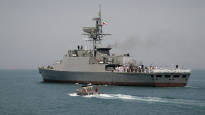Russia is not the only country in the world that has wanted to change its maritime borders unilaterally. The control of maritime areas is a critical issue for the great powers.
Yesterday, Wednesday, the media was dominated by information about Russia’s intentions to unilaterally change its maritime borders with Finland and Lithuania. The intentions of the eastern neighbor were commented on by the president and foreign minister as well as numerous researchers. At least Russia’s concrete intentions remained open.
We are not used to having disputes over maritime boundaries or the management of maritime areas, but similar and much worse disputes and tense situations are commonplace in the world.
Disagreements are related to maritime resources, trade, great power politics, or all of these.
South China Sea
Among the countries of the world, China respects probably the least international maritime law. It can be seen particularly blatantly in the South China Sea, where the country disputes maritime territories with the Philippines, Taiwan, Vietnam, Indonesia, Brunei and Malaysia.
On historical grounds, China considers everything so-called as its own territory within a border of nine lines. China’s requirements are breaking international legislation. Other parties have their own territorial requirements.
The reason for the disagreement is clear: in the South China Sea area is estimated more than 50 trillion cubic meters of natural gas reserves and 11 billion barrels of oil.
Perhaps an even more critical issue in the region is the control of the Strait of Malacca, through which passes 30 percent of the entire world’s trade. It is a lifeline for China.
In addition, there is a power that haunts the background: China want to make it clear that it is above international law if it wishes.
Strait of Hormuz
In many ways, the parties to the Strait of Hormuz dispute are Iran and the international oil trade, but the biggest opponent in the region is still the distant United States. The great power considers it its right to secure the transit of the narrow sea area between the Arab Emirates, Oman and Iran.
Iran likes it again with the right to regulate trade passing through the area.
The reason is oil: almost a third all the world’s oil trade goes on tankers through the strait to the Persian Gulf.
Iran has occasionally seized oil tankers passing through the region, often in protest of sanctions. The tension between Iran and Israel increases. Iran has threatened in 2011, for example to close the strait completelywhich would almost inevitably lead to a military confrontation.
Eastern Mediterranean
In the Eastern Mediterranean, the fiercest disputes are between Greece and Turkey, who are nominally allies through NATO membership. It hasn’t stopped countries from slipping over the years time and time again even war to the brink. Fierce disputes took place, for example, at the end of the last decade.
Tensions are exacerbated by the situation in Cyprus: Greece supports the state of Cyprus, but Turkey occupies the northern parts of the country through its puppet state.
The dispute is about the ballast of history, the control of the area, but also about resources: there are natural gas and oil deposits in the disputed sea areas.
Israel and Lebanon also tried to hide for a long time about the maritime border and the management of natural gas deposits in the eastern Mediterranean, but the two countries reached an agreement the following year. It is unclear whether Israel’s recent attacks on Lebanon will play a role in the future.
Falkland Islands
In the Falkland Islands, there is also talk of oil, which is in the area may even be 800 million barrels. The dispute has continued for decades and dates back to colonial times.
The parties are Britain and Argentina, whose disagreement over the ownership of the islands and the sea area surrounding them turned into a war in 1982.
The dispute also affects the so-called blue gap north of the islands. Blue hole is one of the very few marine areas of the world where there is no agreement on fishing rights. Consequently, a large area of the sea is being plundered, which is a great threat to the area’s fish stocks and biodiversity.
All Russian controversies
Russia already has a long list of disputed sea areas.
After Russia invaded Ukraine in 2014 and occupied the Crimean peninsula, the countries argued for a long time before the start of the Ukrainian war in 2022 over the control of the Sea of Azov and the Strait of Kerch. Last year Russia proclaimed the Sea of Azov into its own inland sea.
Since the Second World War, Russia and Japan have had an ongoing dispute over the control of the Kuril Islands and the sea areas surrounding them. The situation tightened considerably again after Japan imposed sanctions on Russia for attacking Ukraine.
Russia is also challenged US seabed management requirements in the Arctic and near the Bering Strait, between Russia and Alaska. On the other hand, Russia is also itself claimed huge areas in the Arctic regions that partly overlap with the areas of Canada and Denmark’s Greenland.
